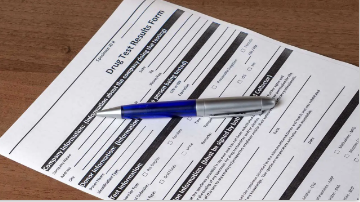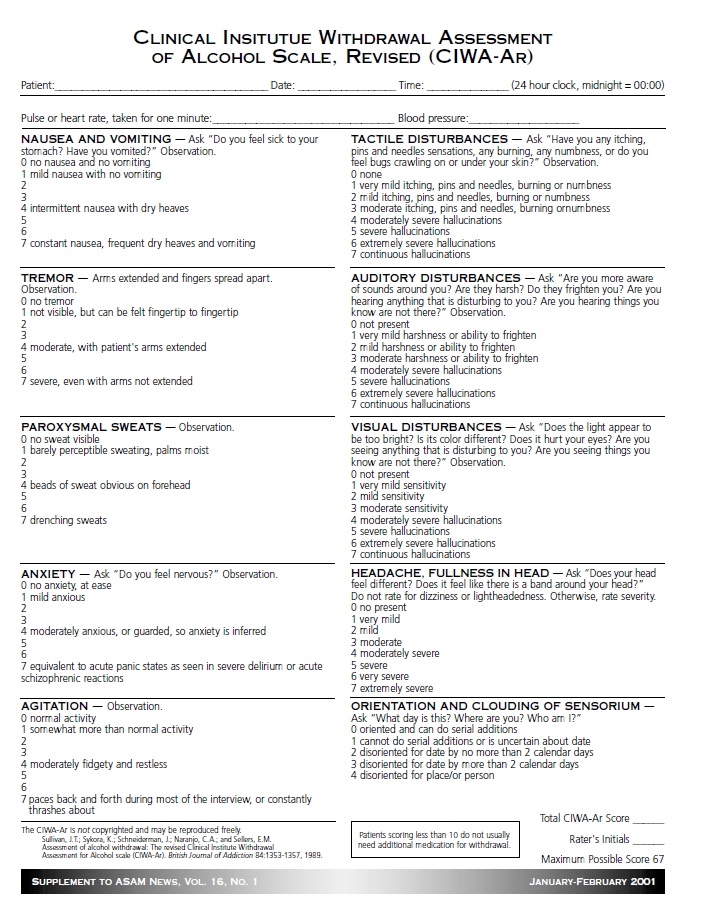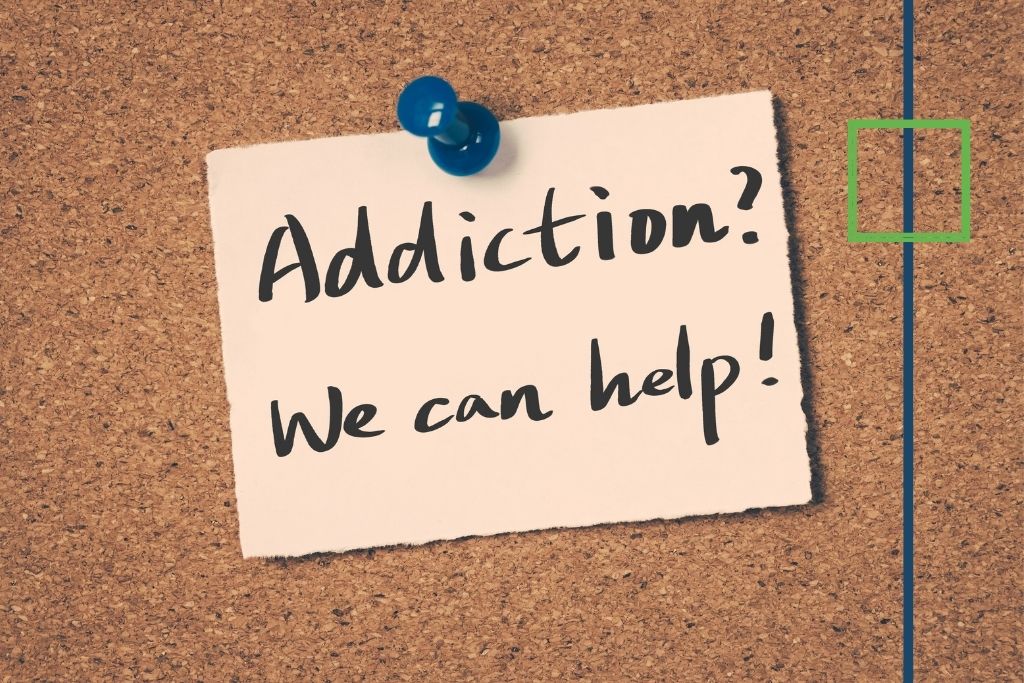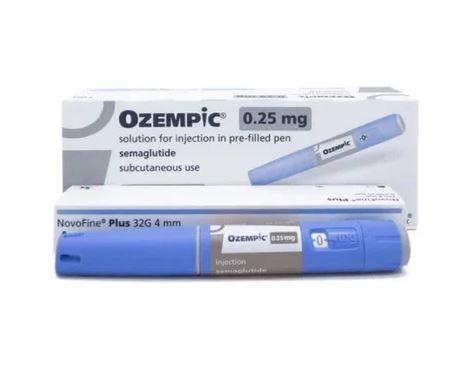What is a CIWA Score?
The CIWA-AR score is a valuable tool in assessing and monitoring alcohol withdrawal symptoms. It helps determine the appropriate treatment plan and allows for regularly monitoring of a patient’s progress. If you or someone you know is experiencing alcohol withdrawal. Get professional medical help that applies tools like the CIWA-AR score to manage symptoms properly. Remember, seeking help is a sign of strength, not weakness.
Take the first step towards recovery and seek the support you need. Call a We Level Up Treatment Center CIWA specialist for your free alcoholism assessment and insurance check. Calls are free, without obligation.
CIWA Scale
Alcoholism treatment providers use the CIWA-AR scale, derived from the Clinical Institute Withdrawal Assessment for Alcohol, to evaluate and track withdrawal symptoms. Patients undergoing alcohol detoxification are scored using the CIWA protocol, an alcohol withdrawal assessment that quantifies the severity of alcohol withdrawal symptoms.
CIWA Protocol
Each symptom evaluated by the CIWA protocol is given a numeric value, and that sum is used to determine the CIWA score. Chills, sweating, anxiety, agitation, and other physical and mental signs of alcohol withdrawal are assessed. When the CIWA test points are added up, the severity of withdrawal can be determined.
More severe withdrawal symptoms are associated with a higher CIWA-scoring individual, while less severe symptoms are associated with a lower score. To manage alcohol withdrawal safely and effectively, addiction treatment professionals can apply the CIWA-AR scale. It’s a helpful resource for directing treatment and monitoring patients during alcohol withdrawal.
CIWA Scoring Chart
The CIWA-AR measures 10 signs and symptoms of alcohol withdrawal. , including:
| Symptom | Score Range |
|---|---|
| Agitation | 0 to 7 |
| Anxiety | 0 to 7 |
| Hearing disturbances | 0 to 7 |
| Sensory clouding | 0 to 7 |
| Headache | 0 to 7 |
| Nausea/vomiting | 0 to 7 |
| Persistent sweating | 0 to 7 |
| Tactile abnormalities | 0 to 7 |
| Tremors | 0 to 7 |
| Visual abnormalities | 0 to 7 |
CIWA-AR for Assessing Alcohol Withdrawal
Evaluating withdrawal symptoms can be more accessible through the CIWA-AR scoring system. In just under 2 minutes, physicians can determine the severity of a patient’s withdrawal syndrome by assigning scores ranging from 0-7 for each symptom. By totaling the scores of 10 symptoms, a clear picture of the withdrawal severity emerges.
Mild, moderate, or severe withdrawal? It’s all about the numbers. Cumulative scores below 8-10 indicate mild withdrawal, while scores between 8-15 point to moderate withdrawal. For those with scores of 15 or more, watch out for severe withdrawal and possible delirium tremens.

Skip To:
- What is a CIWA Score?
- How Should the CIWA-Ar Assessment Be Used?
- How is the CIWA-Ar Scored?
- The CIWA-AR Screening Questions
- The Validity & Reliability of the CIWA-AR
- CWIA Score Calculator
- CWIA Score Interpretation
- CWIA Score PDF
- CWIA Score Protocol
- CWIA Score Alcohol Withdrawal
- CWIA Score and Treatment
Learn More:
- Am I An Alcoholic Quiz Free, Online, & Confidential
- Effective Treatment For Alcohol Withdrawal Symptoms
- Alcoholism Treatment, Signs, Complications & Rehab Programs
- Drug and Alcohol Assessment. Find Drug and Alcohol Assessment Near Me. What Should You Expect An Alcohol and Drug Assessment?
- Am I An Alcoholic Quiz Free, Online, & Confidential
- Free Alcohol And Breastfeeding Calculator. When Can I Breastfeed After Drinking Calculator? Learn When Is It Safe To Drink When Breastfeeding?
- Alcohol Breathalyzer. How Long Can a Breathalyzer Detect Alcohol?
- The Benefits of Drug & Alcohol Counseling, Drug Counseling for Addiction
Take the Am I An Alcoholic Test
Not sure if you or someone you know may be experiencing alcohol withdrawal? Take the Am I An Alcoholic Quiz to assess your risk coupled with your CIWA-AR score for more details. Remember, seeking professional help is always recommended for managing alcohol withdrawal symptoms.
The We Level Up Treatment Center network can help you find solace and effective treatment to make alcohol withdrawal more safe and comfortable through our accredited medication-assisted treatment programs.
Get Help. Get Better. Get Your Life Back.
Searching for Accredited Drug & Alcohol Rehab Centers Near You? Or Mental Health Support?
Even if you have failed previously, relapsed, or are in a difficult crisis, we stand ready to support you. Our trusted behavioral health specialists will not give up on you. Call us when you feel ready or want someone to speak to about therapy alternatives to change your life. Even if we cannot assist you, we will lead you wherever you can get support. There is no obligation. Call our hotline today.
FREE Addiction Hotline – Call 24/7
How Should the CIWA Assessment Be Used?
The Clinical Institute Withdrawal Assessment (CIWA-Ar) is a helpful tool used in medical settings to track and treat alcohol withdrawal. It’s a valuable tool for doctors to assess the severity of withdrawal symptoms and plan treatment. Professional medical personnel should evaluate at predetermined intervals to guarantee reliable monitoring and prompt treatment. Safe and effective management of alcohol withdrawal is possible thanks to the CIWA-Ar scores, which help doctors determine the best course of treatment, which may include medication and supportive care.

Get Your Life Back
Find Hope & Recovery. Get Safe Comfortable Detox, Addiction Rehab & Mental Health Dual Diagnosis High-Quality Care at the We Level Up Treatment Centers Network.
Hotline (877) 378-4154The CIWA-Scale Screening Questions
CIWA Scoring involves medical personnel asking specific questions to ensure the responses align with the necessary range for completing the scale. CIWA tests can help determine the presence of withdrawal symptoms in an individual. The assessment will look at the following symptoms:
1. Nausea and Vomiting:
- Have you recently experienced nausea or vomiting?
- Scoring:
- 0: No nausea or vomiting.
- 1: Mild nausea, no vomiting.
- 2: Intermittent nausea, dry heaves.
- 3: Constant nausea, dry heaves.
- 4: Nausea and vomiting.
2. Tremors:
- Do you notice your hands trembling?
- Scoring:
- 0: No tremor.
- 1: Tremor felt, not visible.
- 2: Mild tremor with arms extended.
- 3: Moderate tremor with arms not extended.
- 4: Severe tremor even at rest.
3. Paroxysmal Sweats:
- Do you have any spells of sweating or flushes?
- Scoring:
- 0: No noticeable sweat.
- 1: Barely noticeable perspiration, moist palms.
- 2: Beads of sweat on forehead.
- 3: Sweat streaming down the face.
- 4: Drenched in sweat.
4. Anxiety:
- Do you feel nervous?
- Are you anxious or worried?
- Scoring:
- 0: Not anxious.
- 1: Mildly anxious.
- 2: Moderately anxious.
- 3: Severely anxious.
- 4: Extremely anxious.
5. Agitation:
- Do you feel more restless or irritable?
- Scoring:
- 0: Normal activity.
- 1: Slightly more activity than usual.
- 2: Moderately restless and fidgety.
- 3: Pacing back and forth or thrashing around.
- 4: Physically dangerous agitation.
6. Tactile Disturbances:
- Do you have itching, tingling, burning, or numbness in your skin?
- Scoring:
- 0: None.
- 1: Very mild itching, prickling, or burning.
- 2: Mild itching, prickling, or burning.
- 3: Moderate itching, prickling, or burning.
- 4: Severe itching, prickling, or burning.
7. Auditory Disturbances:
- Do you hear any disturbing noises?
- Scoring:
- 0: Not present.
- 1: Very mild harshness or frightening potential.
- 2: Slight harshness or frightening potential.
- 3: Moderate harshness or frightening potential.
- 4: Severe hallucinations.
- 5: Extremely severe hallucinations.
- 6: Continuous hallucinations.
8. Visual Disturbances:
- Do you see things that are not there?
- Scoring:
- 0: Not present.
- 1: Very mild sensitivity.
- 2: Slight sensitivity.
- 3: More pronounced sensitivity.
- 4: Severe hallucinations.
- 5: Extremely severe hallucinations.
- 6: Continuous hallucinations.
9. Headache, Fullness in Head:
- Do you have a headache or a sense of fullness in your head?
- Scoring:
- 0: Not present.
- 1: Very mild.
- 2: Mild.
- 3: Moderate.
- 4: Severe.
- 5: Very severe.
- 6: Extremely severe.
10. Orientation and Clouding of Sensorium:
- What day is it today?
- Where are you?
- Who am I?
- Scoring:
- 0: Oriented.
- 1: Oriented but hesitant.
- 2: Requires repeated questioning for orientation.
- 3: Limited orientation.
- 4: No orientation.
Comfortable Facilities & Amenities
High-Quality Addiction & Mental Health Rehabilitation Treatment
Rehab Centers TourRenowned Addiction Centers. Serene Private Facilities. Inpatient rehab programs vary.
Addiction Helpline (877) 378-4154Proven recovery success experience, backed by a Team w/ History of:
15+
Years of Unified Experience
100s
5-Star Reviews Across Our Centers
10K
Recovery Success Stories Across Our Network
- Low Patient to Therapist Ratio
- Onsite Medical Detox Center
- Comprehensive Dual-Diagnosis Treatment
- Complimentary Family & Alumni Programs
- Coaching, Recovery & Personal Development Events
The Validity and reliability of CIWA-AR
Alcohol withdrawal symptoms can be evaluated and measured with the help of the Clinical Institute Withdrawal Assessment for Alcohol, Revised (CIWA-Ar). Accurate and consistent assessments are crucial for efficient medical interventions; this is where validity and reliability come in. The CIWA-Ar scale’s validity and reliability are examined in more detail below.
Validity:
- Face Validity: The CIWA-Ar’s items are straightforward and directly measure the observable and subjective symptoms of alcohol withdrawal, making it face valid.
- Content Validity: The scale was developed through expert consensus, ensuring it covers a comprehensive range of withdrawal symptoms.
- Criterion Validity: Studies have shown that the CIWA-Ar scores correlate well with clinical assessments, supporting its criterion validity.

Reliability:
- Inter-Rater Reliability: The CIWA-Ar has demonstrated good inter-rater reliability, meaning that different healthcare professionals will likely obtain similar scores when assessing the same patient.
- Test-Retest Reliability: The scale has also shown acceptable test-retest reliability, indicating consistent scores when administered to the same individual at different times.
- Internal Consistency: The CIWA-Ar’s items are internally consistent, measuring related aspects of alcohol withdrawal.
The CIWA-Ar has proven helpful as a standardized tool for assessing alcohol withdrawal symptoms, thanks to its established validity and reliability. With its reliable readings, healthcare providers can better assess an individual’s alcohol withdrawal symptoms and provide the necessary level of treatment.
World-class, Accredited, 5-Star Reviewed, Effective Addiction & Mental Health Programs. Complete Behavioral Health Inpatient Rehab, Detox plus Co-occuring Disorders Therapy.
CALL (877) 378-4154End the Addiction Pain. End the Emotional Rollercoaster. Get Your Life Back. Start Drug, Alcohol & Dual Diagnosis Mental Health Treatment Now. Get Free No-obligation Guidance by Substance Abuse Specialists Who Understand Addiction & Mental Health Recovery & Know How to Help.
CIWA Calculator
Healthcare providers can use the CIWA calculator (Clinical Institute Withdrawal Assessment for Alcohol, Revised)to determine how severe their patients’ alcohol withdrawal symptoms are. The CIWA-AR calculator factors in the patient’s responses to questions about withdrawal symptoms like tremors, sweating, nausea, and anxiety, as well as vital signs like heart rate and blood pressure.
Medical professionals calculate and score an evaluation from the patient’s responses and vital signs. The severity of alcohol withdrawal symptoms can be measured with this score, which helps doctors decide whether or not to use medication and how intensive care should be given.
Using the CIWA-AR score calculator ensures consistent and accurate evaluation of patient’s conditions and the selection of appropriate interventions by providing a standardized and objective way to evaluate alcohol withdrawal. It helps medical staff provide better treatment for people going through alcohol withdrawal.
Experience Transformative Recovery at the We Level Up Treatment Center.
See our authentic success stories. Get inspired. Get the help you deserve.



Start a New Life
Begin with a free call to an addiction & behavioral health treatment advisor. Learn more about our dual-diagnosis programs. The We Level Up treatment center network delivers various recovery programs at each treatment facility. Call to learn more.
- Personalized Care
- Caring Accountable Staff
- Comfortable Amenities
- Licensed & Accredited
- Renowned w/ 5-Star Reviews
We’ll Call You
CIWA Score Interpretation
Healthcare providers must be able to interpret CIWA correctly (Clinical Institute Withdrawal Assessment for Alcohol) scores to accurately assess the severity of alcohol withdrawal symptoms and select an effective treatment plan. The CIWA scale uses the patient’s self-report to quantitatively evaluate several withdrawal symptoms, including tremors, sweating, agitation, and nausea.
Interpreting CIWA scoring involves the following key points:
- Total Score: The CIWA responses are calculated by summing up the numerical values assigned to each symptom. Scores typically range from 0 to 67.
- Severity Levels: Scoring is often categorized into different severity levels, indicating the intensity of withdrawal symptoms:
- Mild alcohol withdrawal is indicated by a score below 10
- Moderate alcohol withdrawal is indicated by scores between 10 and 20
- Severe alcohol withdrawal is indicated by scores above 20
- Treatment Thresholds: The interpretation of the CIWA protocol guides treatment decisions. For instance:
- Scores below 8 generally require no medication is needed for alcohol withdrawal.
- For scores between 8 and 15, medication may be considered for specific symptoms.
- For scores above 15, medication intervention is usually recommended to manage severe symptoms.
CIWA PDF
The CIWA PDF is valuable for healthcare professionals assessing and managing alcohol withdrawal. This PDF provides a comprehensive overview of the Clinical Institute Withdrawal Assessment for Alcohol (CIWA-AR) protocol, widely used to evaluate the severity of alcohol withdrawal symptoms. Example of a typical CIWA-AR test form:

CIWA Protocol
Detoxification patients’ alcohol withdrawal symptoms are evaluated and treated according to the standardized CIWA (Clinical Institute Withdrawal Assessment for Alcohol) protocol. To ensure the patient’s safety and well-being, this protocol is used to guide the assessment of withdrawal symptoms, to determine the severity of withdrawal, and to inform treatment interventions.
The CIWA protocol typically involves the following steps:
- Initial Assessment: A trained healthcare provider evaluates the patient’s medical history, alcohol consumption patterns, and withdrawal symptoms. The CIWA assessment is usually initiated when a patient is at risk of alcohol withdrawal or is experiencing early withdrawal symptoms.
- Symptom Evaluation: The healthcare provider uses the CIWA-Ar (Clinical Institute Withdrawal Assessment for Alcohol, Revised) scale to assess specific withdrawal symptoms. These symptoms include nausea, tremors, anxiety, agitation, headache, and more. Each symptom is assigned a numerical value based on the patient’s self-reported experience and physical observations.
- Scoring: The CIWA-AR scores for each symptom are totaled to calculate an overall score. This score helps determine the severity of alcohol withdrawal.
- Treatment Decision: Based on the CIWA protocol response, healthcare professionals make informed decisions regarding treatment interventions. These may include medication to alleviate specific symptoms, fluid and electrolyte management, and monitoring vital signs.
- Medication Administration: Medications like benzodiazepines may be prescribed to manage severe withdrawal symptoms. The type and dosage of medication are determined based on the CIWA test results and the patient’s medical history.
- Monitoring and Adjustments: The patient’s CIWA quiz is regularly monitored to assess the effectiveness of the interventions. Medication dosages or other treatments may be adjusted based on changes in the CIWA-AR scores.
- Continued Care: The CIWA protocol is part of a comprehensive care plan. Patients are closely monitored throughout detoxification, and the treatment plan is adjusted as needed.
The CIWA protocol guarantees that people going through alcohol withdrawal are given the care they need. Healthcare providers can aid in patient safety and morale during this trying time in recovery by methodically evaluating and treating withdrawal symptoms.
Post-CIWA Assessment Treatment
Treatment for an alcohol use problem requires more than just the CWIA score treatment. If you suspect a loved one is experiencing alcohol abuse or consumption issues, consider relying on a reputable treatment center like We Level Up NJ. We do everything we can to help you move away from a life full of alcohol and substance abuse to help you lead a life of sobriety.
Our approach may include the usage of prescription drugs and other medical treatments. The staff at your treatment center will assist you in determining what gave rise to your addiction during rehab. They will also teach you techniques that will allow you to change your behavioral patterns and fight the negative ideas that contributed to your addiction. Sometimes the stresses and issues in your life drive you to resort to drugs or alcohol to forget about them temporarily.

Do not attempt to detox on your own. Without professional help, the detoxification process can be unpleasant and challenging. Detox, though, must be completed to continue receiving treatment. We Level Up offers proper care with a 24-hour medical staff to support your recovery through the program to treat alcohol addiction medically. So, retake control of your life and call us to speak with a treatment expert. Our counselors will respond to your concerns since they understand your situation. Call us today to receive help as soon as possible.
CIWA FAQs
-
What does a CIWA score of 36 indicate?
A CIWA and cows score of 36 means that that person faces severe withdrawal and needs immediate treatment.
-
What is the CIWA score benzodiapines?
Depending on the dosage of benzodiazepines, your CWIA score won’t likely be affected.
-
What does a CIWA score of 15 mean?
A CWIA score of 15 or above indicates a patient has severe withdrawal (delirium tremens).
-
What does a CIWA score of 8 mean?
CIWA scores of 8 or below mean a person has minimal to mild withdrawal.
-
What is the CIWA score to give Ativan? or the CIWA score for Ativan dosing?
For patients with a CWIA score of 9-15, 1 mg of Ativan is given every 4 hours.
-
What is the max CIWA score?
What is the highest CIWA score? It is 67.
-
How often do you do CIWA score?
CWIA-AR test can be conducted every 4-8 hours until the score is lower than 8 points.
-
What was Andrew Davis’s VSIM CIWA score?
Andrew Davis had a CIWA score of 20-25, indicating he faced severe withdrawal (delirium tremens).
How to stop Drinking? Top 10 Tips to Sober Up from Alcohol, Weed, Meth, Cocaine, and More.
Do you want to break your addiction to substances? If you want to live a happier, healthier life, we made a video to show you how to do it. Examine the top ten methods experts recommend for quickly and safely withdrawing from drugs like alcohol, weed, meth, and cocaine. This video gives you the tools to take charge of your health, from straightforward techniques to insightful advice.
These tried-and-true suggestions can help you get back on the right track, whether you’re trying to start over, regain your concentration, or enhance your general well-being. Listen in to gain insight and start a life-changing journey toward sobriety.
Search CIWA Score for Alcohol Withdrawal. What Is the CIWA Scale?/ Detox & Mental Health Topics & Resources
Sources
- American Society for Addiction Medicine. (2001). Addiction Medicine Essentials.
- Knight, E., & Lappalainen, L. (2017). Clinical Institute Withdrawal Assessment for Alcohol-Revised might be unreliable in managing alcohol withdrawal. Canadian family physician Medecin de famille canadien, 63(9), 691–695.





